A History of VHS Companies Part Three

RAEDON
HOME VIDEO - Rather than the usual
distributor bio, I'm going to give this space over to resident Readon
expert Mike Malloy:
The
Worst Movies Ever Made: Raedon and the '80s Video Boom - by
Mike Malloy
Your
head will hurt. Your eyes will sting. Your brain will rot. You will
wonder why you ever shoved ALIEN PRIVATE EYE, ROLLERBLADE WARRIORS or any other Raedon Home Video release into your VCR. And more to the
point, you will wonder how this Raedon direct-to-video garbage ever
got made.
The
answer is the 1980s. Or, more specifically, the 1980s video boom.
The VCR had created a new, wide-open
 market -- home video -- for movies. Mom-and-pop video stores,
prevalent over chains at the time, were blindly stocking just about
anything that was offered up. Cheapjack video labels proliferated -- Vestron, Lightning, Prism, Academy, Transworld, Vidmark, Magnum.
market -- home video -- for movies. Mom-and-pop video stores,
prevalent over chains at the time, were blindly stocking just about
anything that was offered up. Cheapjack video labels proliferated -- Vestron, Lightning, Prism, Academy, Transworld, Vidmark, Magnum.
And
then there was Raedon Home Video. For those who think they know the
definition of amateurish moviemaking, throw out your standards. A
typical Raedon release features actors mispronouncing common words,
anachronistic period costumes that are 250 years off the mark and
love scenes with actors that appear to be entirely unfamiliar with
the sex act. This is, of course, in addition to unintelligible
dialogue, camera angles and acting. The quality of these movies
cannot be understated.
But
even if Raedon is guilty of egregious transgressions against the art
of cinema, the video label does serve one important function to
culture: the story of the '80s video boom can most colorfully be told
through the history of this single video distributor.
"In
those days, it was kind of like the Wild West," says Bruce G.
Hallenbeck, whose 1989 film VAMPYRE was picked up by Raedon.
"There were no real fast and hard rules, and everything was kind
of being made up as it went along. And you could pretty much release anything."
So
this VCR-created boom was good for aspiring '80s filmmakers, maybe
not so good for the artistic quality of low-budget cinema.
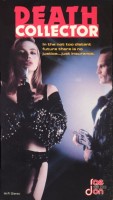 "It
ruined everything," says filmmaker Michael Lang. "It
destroyed the B-movie theatrically." Lang worked in several
capacities on the 1989 futuristic rockabilly sci-fi Western film DEATH
COLLECTOR, a surprisingly tolerable Raedon video release.
"It
ruined everything," says filmmaker Michael Lang. "It
destroyed the B-movie theatrically." Lang worked in several
capacities on the 1989 futuristic rockabilly sci-fi Western film DEATH
COLLECTOR, a surprisingly tolerable Raedon video release.
Understand,
in the 1970s, low-budget exploitation films were experiencing their
golden age, playing at drive-ins and grindhouses across the country,
giving the world stylish cult faves like The Texas Chain Saw
Massacre, Vanishing Point, Sweet Sweetback's Badasssss Song and
Assault on Precinct 13.
Compare
those titles against the disposable, what-the-hell-is-this-shit '80s
fare offered in the Raedon catalog: PUNK
VACATION, GAME OF SURVIVAL, NUDITY REQUIRED, FEELIN'
SCREWY -- films that are even worse than their titles might indicate.
Raedon
Home Video got into the VHS game in the late '80s, about ten years
into that format's existence. By then, many low-budget filmmakers
weren't even gunning for theatrical releases for their movies. They
were simply hoping to dump their movies into a video release. And
Raedon obliged.
Based
in Southern California (Northridge then Chatsworth), Raedon often
dealt with movie sales companies like Double Helix and Panorama
instead of brokering home video deals with the filmmakers themselves.
This meant sometimes a director had little contact with the video
label distributing his movie.
"The
first day I saw the tape in a video store here I was stunned,"
says Hallenbeck, "because I hadn't been told it was going to be
out that soon. About six months after we completed all the post
production it was in the stores. At one of the local video stores
here, the owner said, 'Hey, your movie's here.' I looked at it and
said, 'I'll be damned. My first feature.'"
But
Lang had a little more contact with the video label. He got to see
Raedon's headquarters.
"It
was just a warehouse," he says. "A warehouse with a few
offices in the front. And the owner was this big fat guy that looked
like Grizzly Adams. He was dressed in a t-shirt and shorts. I wasn't
exactly impressed."
But
what should one expect from the distributor of movies that are
arguably the worst ever made? Even Raedon filmmakers concede that the
label's releases are rubbish.
Says
Lang, "Raedon was for the filmmakers who were basically inept
fools who made inept product which they couldn't sell to anyone else,
so they ended up at Raedon. Or Troma. I mean, Troma is the other
Raedon of the business. Troma is just smarter, because they made
their own movies, and they made trashy movies."
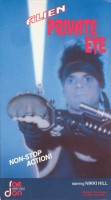
Clearly,
the centerpiece of ineptitude in Raedon's catalog is a 1987 film
entitled ALIEN PRIVATE EYE. The film may not yet have a Plan
9-type status as a Holy Grail of Bad Cinema, but those who have seen
it know the score. A video copy on Half.com recently had the asking
price of $69.75.
"It's
a piece of shit," says actor Robert Axelrod, who played the
villainous Scunge in the film ("I was 'Scunge.' That's a stupid name.").
"I
was astonished at the ineptitude," says Michael Jonascu, who
worked on the film's sound but didn't want his company's name to
appear in the closing credits.
ALIEN
PRIVATE EYE is deserving of this derision and more. It stars
former Chippendales dancer Nikki Hill (aka Nikki Fastinetti) as
Lemro, the eponymous extra-terrestrial gumshoe. The plastic Spock
ears let us know he's an alien. The clichéd fedora lets us
know he's a private eye. Other than that, Hill just tries to play
Lemro as an '80s tough guy ("Yo!") in a performance that
makes the viewer sad to be a human being.
"I
did [later] see it in a video bin," says Jonascu of ALIEN
PRIVATE EYE. "It was like a buck ninety-nine. And I thought,
'You know, I should probably pick this up. It's part of my
filmography, for better or worse.' And I didn't. I think that kind of
says a lot of it. It was two bucks and I didn't want to shell out the
cash for it."
Surprisingly,
there is actually a "name" filmmaker who has an early
credit in the movie: writer-director Scott Spiegel, who is well known
in horror circles for his involvement in the Evil Dead and From Dusk
Till Dawn series. Spiegel feels no embarrassment for his minor
participation in this sub-sub-competent flick.
"You
have to understand," he says. "When I came out here from
Detroit, that was still kind of fun. That was cool. Someone was
making movies. Let's do it."
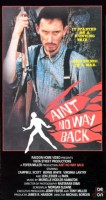 In
fact, Raedon releases occasionally catch a star on the way up or
down. A pre-fame Campbell Scott (Singles, Roger Dodger) appears in AIN'T
NO WAY BACK, a bizarre mishmash of Deliverance and Witness. And
washed-up stars of yesteryear like Julie Newmar, Troy Donahue and
Rory Calhoun each slummed in a Raedon film.
In
fact, Raedon releases occasionally catch a star on the way up or
down. A pre-fame Campbell Scott (Singles, Roger Dodger) appears in AIN'T
NO WAY BACK, a bizarre mishmash of Deliverance and Witness. And
washed-up stars of yesteryear like Julie Newmar, Troy Donahue and
Rory Calhoun each slummed in a Raedon film.
Fortunately,
all things -- even the indescribably horrid -- must end. The '80s
video boom became the video glut of 1990.
"It
was the last time with all those crappy movies being sold, when
people were actually buying that stuff," says Lang. "The
'80s were an incredible time for that, with the ravenous need for
video product. But it got so glutted that by 1990 it just completely
collapsed. The floor was like a trap door."
"Buyers
were looking for better product, higher quality product,"
continues Lang. "I think that killed Raedon too. The video store
owners had had enough of all this crap. I mean, it worked for a few
years, but I think there was just too much of it."
So
what lessons were learned? Maybe few. Lang, Hallenbeck and Jonascu
say they see a present-day parallel to home video's legitimization of
16mm hack filmmaking of the late '80s.
"A
lot of people dove in at that point," says Jonascu. "And I
think the thing that is most like that now is that DV has gotten so
good that you're starting to see a lot of the same thing happening again."
As
for final thoughts on the phenomenon of the '80s video boom, Lang
says it most succinctly: "Raedon caught the wave. And then the
wave left them. It left everybody."
But
Spiegel has the best understanding of the route the era's low-budget
filmmaking should have taken.
"Some
of that product is so bad, it should have gone direct to audio."
Malloy's
article originally appeared in FLAUNT magazine Issue 66 and is
re-printed here by arrangement with the author. Malloy is a widely
published film journalist and cinema book author, whose work has
appeared on Slate.com, FILMFAX, CULT MOVIES, ENTERTAINMENT TODAY,
SHOCK CINEMA, STAR TREK COMMUNICATOR and VIDEO WATCHDOG. He wrote LEE
VAN CLEEF, the biography of Spaghetti Western star Lee
Van Cleef, for
McFarland & Company as a 19-year old, and he is currently
engaged in writing MOVIE TOUGH GUYS OF THE 1970s: AN ENCYCLOPEDIA.

REGAL
VIDEO, INC. - Not much is known
about this New York City-based label (Rumor has it that is was
started by two 
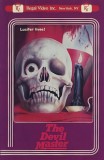 furniture
business owners), but they are notorious for many reasons, including
the legality of their releases, the crappy transfer quality of the
films and the garish artwork on their clamshell cases during their
short run in the mid-80's. They are most famous for unleashing THE
REVENGE OF DOCTOR X,
a film that no one can really agree about except that it stars James
Craig and bears the credits for THE MAD DOCTOR OF BLOOD ISLAND.
Some sources state that it is actually a 1970 film titled THE
DOUBLE GARDEN (a.k.a. THE VENUS FLYTRAP) directed by
Kenneth G. Crane and written by Ed Wood Jr., while other sources list
it as a 1966 production titled BODY OF THE PREY, directed and
written by Norman Thompson (as "Earl Norman"). Until a
proper print of this film is found bearing the true credits, we just
have to revel in its awfulness sans knowing the truth. Regal Video
also unleased BLOOD FREAK for the first time on VHS, as well as THREE
ON A MEATHOOK, THE DEVIL MASTER (a.k.a. THE DEMON LOVER), NIGHTMARE CIRCUS (a.k.a. BARN
OF THE NAKED DEAD), DEATH
WISH CLUB and
various other horror and martial arts titles before going out of
business and selling their library to budget label Video
Treasures. One thing was for sure: Whoever did the artwork on
their video boxes was obsessed with blonde-haired women and used them
unsparingly on the covers, whether they had anything to do with the
film or not. One of the true standouts on video shelves during the
80's, but not always for good reasons.
furniture
business owners), but they are notorious for many reasons, including
the legality of their releases, the crappy transfer quality of the
films and the garish artwork on their clamshell cases during their
short run in the mid-80's. They are most famous for unleashing THE
REVENGE OF DOCTOR X,
a film that no one can really agree about except that it stars James
Craig and bears the credits for THE MAD DOCTOR OF BLOOD ISLAND.
Some sources state that it is actually a 1970 film titled THE
DOUBLE GARDEN (a.k.a. THE VENUS FLYTRAP) directed by
Kenneth G. Crane and written by Ed Wood Jr., while other sources list
it as a 1966 production titled BODY OF THE PREY, directed and
written by Norman Thompson (as "Earl Norman"). Until a
proper print of this film is found bearing the true credits, we just
have to revel in its awfulness sans knowing the truth. Regal Video
also unleased BLOOD FREAK for the first time on VHS, as well as THREE
ON A MEATHOOK, THE DEVIL MASTER (a.k.a. THE DEMON LOVER), NIGHTMARE CIRCUS (a.k.a. BARN
OF THE NAKED DEAD), DEATH
WISH CLUB and
various other horror and martial arts titles before going out of
business and selling their library to budget label Video
Treasures. One thing was for sure: Whoever did the artwork on
their video boxes was obsessed with blonde-haired women and used them
unsparingly on the covers, whether they had anything to do with the
film or not. One of the true standouts on video shelves during the
80's, but not always for good reasons.

REPUBLIC
PICTURES HOME VIDEO - First,
a little history lesson. Republic Pictures was founded in 1935 by
Herbert J. Yates and, during it's early years, produced numerous
small B-Westerns (making stars out of John

 Wayne,
Gene Autry and Roy Rogers in the process) and serials (i.e. THE
ADVENTURES OF CAPTAIN
MARVEL - 1941). Eventually, Republic Pictures would make A-list
films like THE SANDS OF IWO JIMA (1949) and THE QUIET
MAN (1952), but Yates always kept his hands in the B-movie field,
churning out small films in every genre (they were also the first
studio to offer their film library to TV in 1951). As the 50's were
coming to a close and the demand for small films was waning (thanks
to TV), Republic Pictures closed up shop in 1959. In 1962, Republic
sold it's film library to National Telefilms Associates (NTA) and, in
the early 80's, NTA began releasing Republic Pictures' films on VHS.
NTA would eventually buy the right to the Republic Pictures name and
logo in 1986 and release films under the Republic Picture Home Video
banner. A mixture of old films (INVASION OF THE BODY SNATCHERS - 1956; MONSTER OF PIEDRAS BLANCAS - 1959; CASTLE
OF EVIL - 1966) and new productions (SCARED STIFF - 1987; DEAD
MAN WALKING - 1987; NIGHT OF THE DEMONS - 1988; PLAYROOM - 1989: CTHULHU MANSION - 1990), Republic Pictures Home Video would release hundreds of genre
titles, many of them Canadian tax shelter films like the SCANNERS and AMITYVILLE series, independent horror films like THE
BOOGENS (1981), SOCIETY (1989) MAD AT THE MOON (1992) and NIGHT
OF THE SCARECROW (1995), actioners like MISSION
OF JUSTICE (1992) and DIGITAL
MAN (1994), and just plain weird films like NIGHTMARE AT NOON (1987) and INVISIBLE MANIAC (1990), until closing up shop in
1995, shortly after being bought by late TV producer Aaron Spelling.
Lionsgate Entertainment (who else?) now owns the majority of the
Republic Pictures theatrical film library.
Wayne,
Gene Autry and Roy Rogers in the process) and serials (i.e. THE
ADVENTURES OF CAPTAIN
MARVEL - 1941). Eventually, Republic Pictures would make A-list
films like THE SANDS OF IWO JIMA (1949) and THE QUIET
MAN (1952), but Yates always kept his hands in the B-movie field,
churning out small films in every genre (they were also the first
studio to offer their film library to TV in 1951). As the 50's were
coming to a close and the demand for small films was waning (thanks
to TV), Republic Pictures closed up shop in 1959. In 1962, Republic
sold it's film library to National Telefilms Associates (NTA) and, in
the early 80's, NTA began releasing Republic Pictures' films on VHS.
NTA would eventually buy the right to the Republic Pictures name and
logo in 1986 and release films under the Republic Picture Home Video
banner. A mixture of old films (INVASION OF THE BODY SNATCHERS - 1956; MONSTER OF PIEDRAS BLANCAS - 1959; CASTLE
OF EVIL - 1966) and new productions (SCARED STIFF - 1987; DEAD
MAN WALKING - 1987; NIGHT OF THE DEMONS - 1988; PLAYROOM - 1989: CTHULHU MANSION - 1990), Republic Pictures Home Video would release hundreds of genre
titles, many of them Canadian tax shelter films like the SCANNERS and AMITYVILLE series, independent horror films like THE
BOOGENS (1981), SOCIETY (1989) MAD AT THE MOON (1992) and NIGHT
OF THE SCARECROW (1995), actioners like MISSION
OF JUSTICE (1992) and DIGITAL
MAN (1994), and just plain weird films like NIGHTMARE AT NOON (1987) and INVISIBLE MANIAC (1990), until closing up shop in
1995, shortly after being bought by late TV producer Aaron Spelling.
Lionsgate Entertainment (who else?) now owns the majority of the
Republic Pictures theatrical film library.

SIMITAR
ENTERTAINMENT - This is what I want
you to do immediately after reading this paragraph: Go to the Simitar
Entertainment page and memorize all the covers you see there. After
you have done so, never, EVER purchase any of them, even if you can
get them for free. They are the worst of the worst. No, not the
films. Some of them are pretty good. I'm talking about the transfers.
Most of them were recorded in the EP speed and have the worst
tracking problems in VCR history. Most of

 Simitar's
tapes are unwatchable and seem to have been mass-produced to make
the buyer extremely angry. I should know. I own a good chunk of them.
Simitar was in existence from 1984 to 2000. While the majority of
their releases were sports, children's and outdoor documentaries,
they did release some films aimed at the horror film lover.
Unfortunately, once you brought the tape home you usually ended up
cursing at your VCR, screaming "Why are you doing this to
me?" at the top of your lungs, thinking that your VCR was the
offending party. Well, we know better now. I was the recipient a few
years ago of aquiring the majority of a small video store's inventory
and about 50 of the tapes were from Simitar. After playing them all
in four different VCRs, only one of them played correctly throughout.
That film was Jeff Hathcock's VICTIMS,
and since it was the only Simitar tape recorded in the SP mode, I'm
not surprised. The only trouble was the print they used looked like a
third generation dupe and was nearly unwatchable anyway. So, heed my
advice and stay away from these releases. A lot of people try to pawn
them off on eBay for outrageous prices. Ask questions and demand to
see the cover before you buy. Here's another little tidbit about
Simitar: In 1999, the World Wrestling Federation sued Simitar for
trademark infringement for selling a CD of music titled WWF-THE
MUSIC, VOL. 3 and won. This led to Simitar's downfall in 2000 when
they declared bankrupcy. The owners then went to Brentwood
Communications, Inc. (BCI) and started a DVD division. Everyone knows
the troubles that ensued with the quality of the early BCI releases.
Some of them would skip in various players and I have one that died
during the final 30 minutes of MESSIAH
OF EVIL. Simitar was also the first independent distributor
to release their films to DVD (in 1997), but they were just as hinky
as their VHS releases.
Simitar's
tapes are unwatchable and seem to have been mass-produced to make
the buyer extremely angry. I should know. I own a good chunk of them.
Simitar was in existence from 1984 to 2000. While the majority of
their releases were sports, children's and outdoor documentaries,
they did release some films aimed at the horror film lover.
Unfortunately, once you brought the tape home you usually ended up
cursing at your VCR, screaming "Why are you doing this to
me?" at the top of your lungs, thinking that your VCR was the
offending party. Well, we know better now. I was the recipient a few
years ago of aquiring the majority of a small video store's inventory
and about 50 of the tapes were from Simitar. After playing them all
in four different VCRs, only one of them played correctly throughout.
That film was Jeff Hathcock's VICTIMS,
and since it was the only Simitar tape recorded in the SP mode, I'm
not surprised. The only trouble was the print they used looked like a
third generation dupe and was nearly unwatchable anyway. So, heed my
advice and stay away from these releases. A lot of people try to pawn
them off on eBay for outrageous prices. Ask questions and demand to
see the cover before you buy. Here's another little tidbit about
Simitar: In 1999, the World Wrestling Federation sued Simitar for
trademark infringement for selling a CD of music titled WWF-THE
MUSIC, VOL. 3 and won. This led to Simitar's downfall in 2000 when
they declared bankrupcy. The owners then went to Brentwood
Communications, Inc. (BCI) and started a DVD division. Everyone knows
the troubles that ensued with the quality of the early BCI releases.
Some of them would skip in various players and I have one that died
during the final 30 minutes of MESSIAH
OF EVIL. Simitar was also the first independent distributor
to release their films to DVD (in 1997), but they were just as hinky
as their VHS releases.

THORN
EMI/THORN EMI HBO/HBO
CANNON/HBO VIDEO - Thorn
EMI has the distinction of being the

 second
oldest video company in the United States (Magnetic
Video, which would eventually evolve into CBS/Fox Video, is the
first), beginning operations in 1977 and, after going through several
name changes, still surviving today. The Thorn EMI name lasted from
1977 to 1983, when it joined forces with cable giant HBO to form
(what else?) Thorn EMI HBO Video. That name lasted until 1985, when
Cannon Films bought the Thorn EMI film library and joined forces with
HBO to form HBO Cannon Video. As Cannon was having financial trouble,
it's partnership with HBO lasted two years and in 1987 the label was
changed to HBO Video, which is still thriving today. In the
beginning Thorn EMI released a lot of 70's and early 80's horror
films, including THE PREY, GIRLS NITE OUT, ZOLTAN,
HOUND OF DRACULA, Earl Owensby's WOLFMAN and A
DAY OF JUDGMENT, DAWN OF THE MUMMY, THE
DEADLY INTRUDER and the video premieres of Sam Raimi's THE
EVIL DEAD and James Cameron's THE TERMINATOR. Under
the other various names the company took, they released the
excellent NIGHT WARNING, XTRO, SPASMS, WARRIOR
OF THE LOST WORLD, ENCOUNTER
AT RAVEN'S GATE, ACT OF VENGEANCE (aka RAPE SQUAD), THE BURNING (the
edited R-rated cut) and many others. Today, HBO Video releases
include many of the cable giant's successful series and cable films,
including THE SOPRANOS, DEADWOOD, SEX IN THE CITY, THE WIRE and others too numerous to mention.
second
oldest video company in the United States (Magnetic
Video, which would eventually evolve into CBS/Fox Video, is the
first), beginning operations in 1977 and, after going through several
name changes, still surviving today. The Thorn EMI name lasted from
1977 to 1983, when it joined forces with cable giant HBO to form
(what else?) Thorn EMI HBO Video. That name lasted until 1985, when
Cannon Films bought the Thorn EMI film library and joined forces with
HBO to form HBO Cannon Video. As Cannon was having financial trouble,
it's partnership with HBO lasted two years and in 1987 the label was
changed to HBO Video, which is still thriving today. In the
beginning Thorn EMI released a lot of 70's and early 80's horror
films, including THE PREY, GIRLS NITE OUT, ZOLTAN,
HOUND OF DRACULA, Earl Owensby's WOLFMAN and A
DAY OF JUDGMENT, DAWN OF THE MUMMY, THE
DEADLY INTRUDER and the video premieres of Sam Raimi's THE
EVIL DEAD and James Cameron's THE TERMINATOR. Under
the other various names the company took, they released the
excellent NIGHT WARNING, XTRO, SPASMS, WARRIOR
OF THE LOST WORLD, ENCOUNTER
AT RAVEN'S GATE, ACT OF VENGEANCE (aka RAPE SQUAD), THE BURNING (the
edited R-rated cut) and many others. Today, HBO Video releases
include many of the cable giant's successful series and cable films,
including THE SOPRANOS, DEADWOOD, SEX IN THE CITY, THE WIRE and others too numerous to mention.

THRILLERVIDEO - When I made people aware that I was doing a visual tour of
video companies of the 80's, I
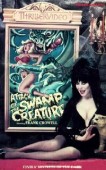
 heard
"Are you going to do ThrillerVideo?" more times than I
care to remember. ThrillerVideo was a sub-label of Family Home
Entertainment (which also ran the Monterey Home Video and U.S.A. Home Video labels) and was active for a short period, from 1983 - 1986.
ThrillerVideo released most of their product in big colorful boxes
and the majority of them were hosted by Elvira, who would do her
schtick at the beginning of the film, interrupt it during the middle
and the show up at the end of the flick to show trailers of coming
ThrillerVideo attractions. Most of Elvira's hosting duties were on
episodes of British TV's 1980 series HAMMER HOUSE OF HORROR and ran less than 60 minutes each. Elvira didn't host ThrillerVideo's
episodes of Britian's 70's series of 90 minute mystery films called THRILLER (shown on ABC's WIDE WORLD OF ENTERTAINMENT and WIDE
WORLD OF MYSTERY at 11:30 PM during the mid to late 70's in the
U.S.). Elvira also hosted the odd horror film, such as Fredric Hobb's
strangely facinating ALABAMA'S
GHOST (which really needs a DVD release), the ultimate
badfilm NATAS: THE REFLECTION and Dan Curtis' TV adaption of THE
STRANGE CASE OF DR. JEKYLL AND MR.
HYDE.
But, even Elvira had her standards. She refused to host five of
ThrillerVideo's more extreme horror films, citing that hosting them
would damage her credibility (!). Those films were: MAKE THEM DIE SLOWLY, NIGHTSTALKER (aka: DON'T GO NEAR THE PARK), BURIED ALIVE, DOCTOR
BUTCHER M.D. and THE 7 DOORS OF DEATH. These five films in
their big boxes command the most money on the collector's market of
all the ThrillerVideo releases, mainly because they were uncut and
they weren't interrupted by Elvira's sometimes cringe-inducing jokes
and gags.
heard
"Are you going to do ThrillerVideo?" more times than I
care to remember. ThrillerVideo was a sub-label of Family Home
Entertainment (which also ran the Monterey Home Video and U.S.A. Home Video labels) and was active for a short period, from 1983 - 1986.
ThrillerVideo released most of their product in big colorful boxes
and the majority of them were hosted by Elvira, who would do her
schtick at the beginning of the film, interrupt it during the middle
and the show up at the end of the flick to show trailers of coming
ThrillerVideo attractions. Most of Elvira's hosting duties were on
episodes of British TV's 1980 series HAMMER HOUSE OF HORROR and ran less than 60 minutes each. Elvira didn't host ThrillerVideo's
episodes of Britian's 70's series of 90 minute mystery films called THRILLER (shown on ABC's WIDE WORLD OF ENTERTAINMENT and WIDE
WORLD OF MYSTERY at 11:30 PM during the mid to late 70's in the
U.S.). Elvira also hosted the odd horror film, such as Fredric Hobb's
strangely facinating ALABAMA'S
GHOST (which really needs a DVD release), the ultimate
badfilm NATAS: THE REFLECTION and Dan Curtis' TV adaption of THE
STRANGE CASE OF DR. JEKYLL AND MR.
HYDE.
But, even Elvira had her standards. She refused to host five of
ThrillerVideo's more extreme horror films, citing that hosting them
would damage her credibility (!). Those films were: MAKE THEM DIE SLOWLY, NIGHTSTALKER (aka: DON'T GO NEAR THE PARK), BURIED ALIVE, DOCTOR
BUTCHER M.D. and THE 7 DOORS OF DEATH. These five films in
their big boxes command the most money on the collector's market of
all the ThrillerVideo releases, mainly because they were uncut and
they weren't interrupted by Elvira's sometimes cringe-inducing jokes
and gags.